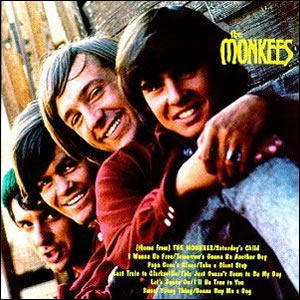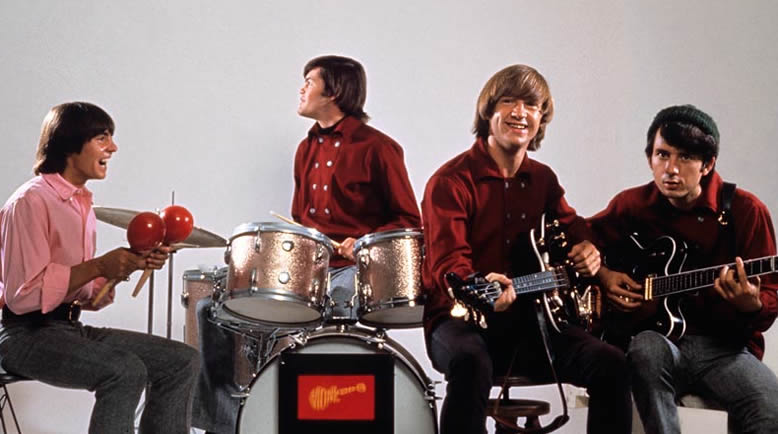The Monkees
 In October 1966, The Monkees released their self-titled debut record, which would become the first of four consecutive number one albums in the US. The album debuted one month after The Monkees television series first aired. While the group was visually portrayed as a traditional four-piece rock band on TV, on this debut record the four members provided nothing but vocals on all but two of the twelve album tracks and no tracks featured all four members of the Monkees.
In October 1966, The Monkees released their self-titled debut record, which would become the first of four consecutive number one albums in the US. The album debuted one month after The Monkees television series first aired. While the group was visually portrayed as a traditional four-piece rock band on TV, on this debut record the four members provided nothing but vocals on all but two of the twelve album tracks and no tracks featured all four members of the Monkees.
The initial concept for the Monkees dates back to 1962 and and an unsuccessful attempt to sell the series by filmmaker Bob Rafelson. Two years later Rafelson and Bert Schneider formed Raybert Productions and that year’s success of the Beatles’ debut film A Hard Day’s Night inspired the team to revive the idea for The Monkees. In April 1965, Raybert sold the show to Screen Gems Television with the original idea of casting the New York folk rock group, The Lovin’ Spoonful. After that initial plan fell through Davy Jones, a then-current actor at Screen Gems, was cast as the first member of a new fabricated group, with a call for the remainder of the band/cast members put out in September 1965. Out of more than 400 applicants, Micky Dolenz, Mike Nesmith and Peter Tork were signed on to The Monkees. All three had previously worked as musicians at differing levels and, once The Monkees was picked up as a series, development of the musical side of the project accelerated.
Producers Tommy Boyce and Bobby Hart were enlisted as chief songwriters for the project and Columbia and Screen Gems entered into a joint venture called Colgems Records as a label and distributor of Monkees records. While the newly formed group did practice playing as a group, Boyce and Hart decided to use top session players for the recording of two albums that were the soundtrack of the TV show’s first season. Music for the debut album was recorded over several sessions in Los Angeles during the summer of 1966.
 The Monkees by The Monkees |
|
|---|---|
| Released: October 10, 1966 (Colgems) Produced by: Tommy Boyce, Bobby Hart, Jack Keller & Michael Nesmith Recorded: Los Angeles, June-July 1966 |
|
| Side One | Side Two |
| (Theme From) The Monkees Saturday’s Child I Wanna Be Free Tomorrow’s Gonna Be Another Day Papa Gene’s Blues Take a Giant Step |
Last Train to Clarksville This Just Doesn’t Seem to Be My Day Let’s Dance On I’ll Be True to You Sweet Young Thing Gonna Buy Me a Dog |
| Group Members | |
| Micky Dolenz Davy Jones Mike Nesmith Peter Tork |
|
Beginning with the signature television opening “(Theme From) The Monkees”, the debut record features Dolenz on lead vocals for most tracks, including the rather hard rock turn on the Davis Gates-penned “Saturday’s Child”. “I Wanna Be Free” is the first of a trio to features Jones on lead vocals with Nesmith taking lead on the pair of tracks he composed, “Papa Gene’s Blues” and “Sweet Young Thing”. While Tork does not sing lead on any tracks, he is the only Monkee to play an instrument anywhere on the album, providing guitar on the two aforementioned Nesmith tracks.
“Last Train to Clarksville” was the album’s biggest hit as it topped the US pop charts and was subsequently featured in seven episodes of the TV series. This jangly folk/rock tune was musically inspired by the Beatles’ recent hit “Paperback Writer”, with lyrics of a man phoning the woman he loves and urging her to meet him at a train station before he must leave, possibly on his way to war.

The Monkees was a worldwide success, topping the charts in several countries, including the US where it remained at number one for a quarter of a year. The album only lost it’s top spot when the group’s follow-up album More of the Monkees, recorded it late 1966 and released in January 1967, took over the number one spot, Combined, the Monkees held the number one album spot in the US for over 30 consecutive weeks.
As swiftly as this success was obtained, the group’s television and recording popularity did not last all that long. After just two successful seasons, the Monkees’ television series was canceled in 1968 as the group members wanted to take a more personal stake in their music and film output. Head, their one and only feature film, was a commercial disaster as it directly challenged the Monkees’ curious stardom but this only served to disconcert their strongest fan base.
~
Part of Classic Rock Review’s celebration of 1966 albums.




